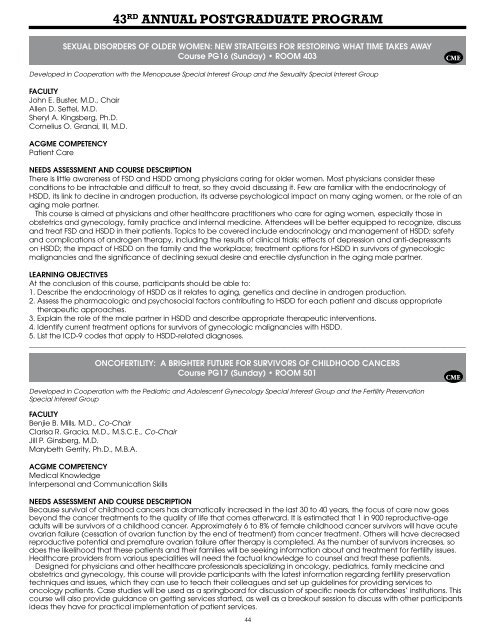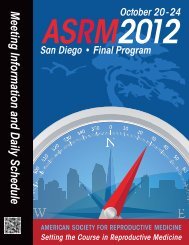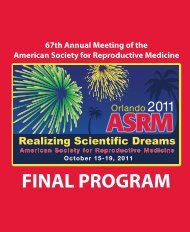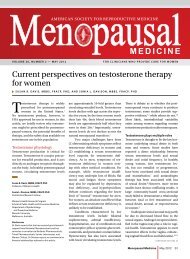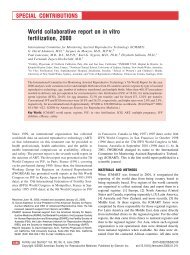scientific program • symposia - American Society for Reproductive ...
scientific program • symposia - American Society for Reproductive ...
scientific program • symposia - American Society for Reproductive ...
You also want an ePaper? Increase the reach of your titles
YUMPU automatically turns print PDFs into web optimized ePapers that Google loves.
43 RD ANNUAL POSTGRADUATE PROGRAM<br />
SEXUAL DISORDERS OF OLDER WOMEN: NEW STRATEGIES FOR RESTORING WHAT TIME TAKES AWAY<br />
Course PG16 (Sunday) <strong>•</strong> ROOM 403<br />
Developed in Cooperation with the Menopause Special Interest Group and the Sexuality Special Interest Group<br />
FACULTY<br />
John E. Buster, M.D., Chair<br />
Allen D. Seftel, M.D.<br />
Sheryl A. Kingsberg, Ph.D.<br />
Cornelius O. Granai, III, M.D.<br />
ACGME COMPETENCY<br />
Patient Care<br />
NEEDS ASSESSMENT AND COURSE DESCRIPTION<br />
There is little awareness of FSD and HSDD among physicians caring <strong>for</strong> older women. Most physicians consider these<br />
conditions to be intractable and difficult to treat, so they avoid discussing it. Few are familiar with the endocrinology of<br />
HSDD, its link to decline in androgen production, its adverse psychological impact on many aging women, or the role of an<br />
aging male partner.<br />
This course is aimed at physicians and other healthcare practitioners who care <strong>for</strong> aging women, especially those in<br />
obstetrics and gynecology, family practice and internal medicine. Attendees will be better equipped to recognize, discuss<br />
and treat FSD and HSDD in their patients. Topics to be covered include endocrinology and management of HSDD; safety<br />
and complications of androgen therapy, including the results of clinical trials; effects of depression and anti-depressants<br />
on HSDD; the impact of HSDD on the family and the workplace; treatment options <strong>for</strong> HSDD in survivors of gynecologic<br />
malignancies and the significance of declining sexual desire and erectile dysfunction in the aging male partner.<br />
LEARNING OBJECTIVES<br />
At the conclusion of this course, participants should be able to:<br />
1. Describe the endocrinology of HSDD as it relates to aging, genetics and decline in androgen production.<br />
2. Assess the pharmacologic and psychosocial factors contributing to HSDD <strong>for</strong> each patient and discuss appropriate<br />
therapeutic approaches.<br />
3. Explain the role of the male partner in HSDD and describe appropriate therapeutic interventions.<br />
4. Identify current treatment options <strong>for</strong> survivors of gynecologic malignancies with HSDD.<br />
5. List the ICD-9 codes that apply to HSDD-related diagnoses.<br />
________________________________________________________________________________________________________________________<br />
ONCOFERTILITY: A BRIGHTER FUTURE FOR SURVIVORS OF CHILDHOOD CANCERS<br />
Course PG17 (Sunday) <strong>•</strong> ROOM 501<br />
Developed in Cooperation with the Pediatric and Adolescent Gynecology Special Interest Group and the Fertility Preservation<br />
Special Interest Group<br />
FACULTY<br />
Benjie B. Mills, M.D., Co-Chair<br />
Clarisa R. Gracia, M.D., M.S.C.E., Co-Chair<br />
Jill P. Ginsberg, M.D.<br />
Marybeth Gerrity, Ph.D., M.B.A.<br />
ACGME COMPETENCY<br />
Medical Knowledge<br />
Interpersonal and Communication Skills<br />
NEEDS ASSESSMENT AND COURSE DESCRIPTION<br />
Because survival of childhood cancers has dramatically increased in the last 30 to 40 years, the focus of care now goes<br />
beyond the cancer treatments to the quality of life that comes afterward. It is estimated that 1 in 900 reproductive-age<br />
adults will be survivors of a childhood cancer. Approximately 6 to 8% of female childhood cancer survivors will have acute<br />
ovarian failure (cessation of ovarian function by the end of treatment) from cancer treatment. Others will have decreased<br />
reproductive potential and premature ovarian failure after therapy is completed. As the number of survivors increases, so<br />
does the likelihood that these patients and their families will be seeking in<strong>for</strong>mation about and treatment <strong>for</strong> fertility issues.<br />
Healthcare providers from various specialities will need the factual knowledge to counsel and treat these patients.<br />
Designed <strong>for</strong> physicians and other healthcare professionals specializing in oncology, pediatrics, family medicine and<br />
obstetrics and gynecology, this course will provide participants with the latest in<strong>for</strong>mation regarding fertility preservation<br />
techniques and issues, which they can use to teach their colleagues and set up guidelines <strong>for</strong> providing services to<br />
oncology patients. Case studies will be used as a springboard <strong>for</strong> discussion of specific needs <strong>for</strong> attendees’ institutions. This<br />
course will also provide guidance on getting services started, as well as a breakout session to discuss with other participants<br />
ideas they have <strong>for</strong> practical implementation of patient services.<br />
44<br />
CME<br />
CME


